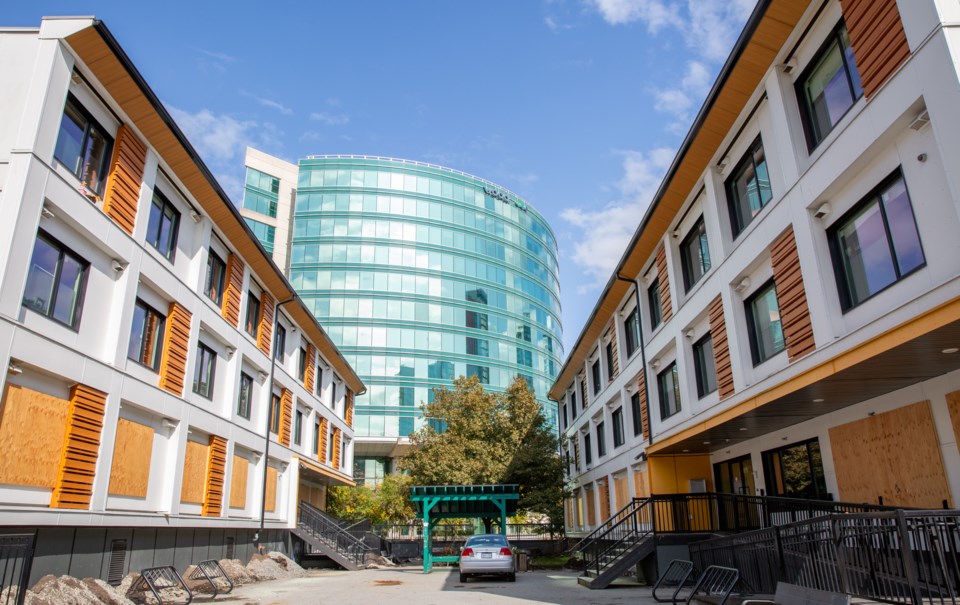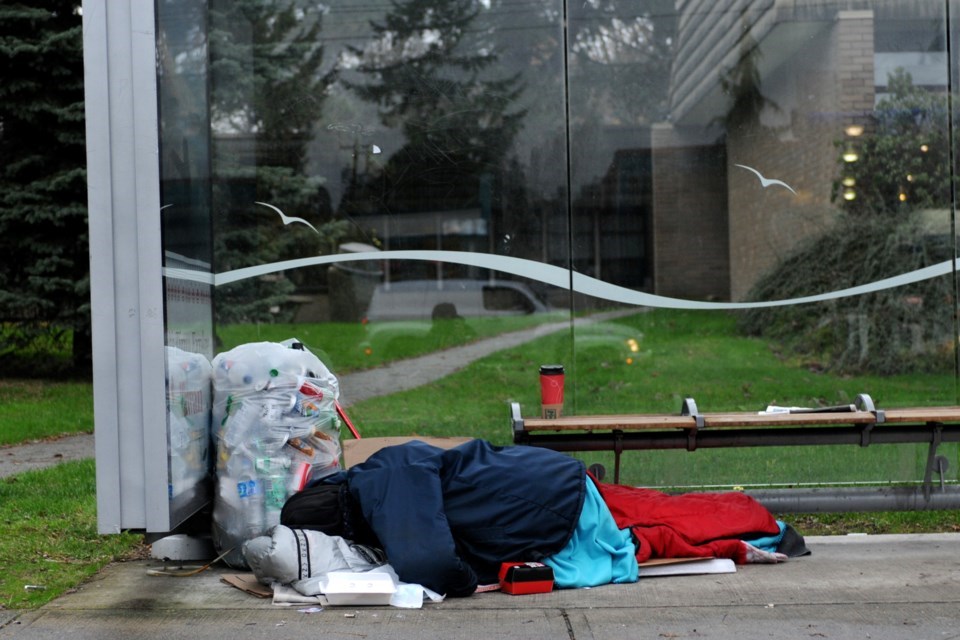A 60-bed “navigation centre” for homeless people promised by the B.C. government in 2020 for Vancouver is still not open and there is no indication whether it will be activated before the end of the year.
The centre, which was supposed to be the first of its kind in Canada, was supposed to be operating by spring 2021, according to an announcement made Aug. 5, 2020 by then-minister responsible for housing, Selina Robinson.
BC Housing said this week in an email that it has identified a location for the centre.
“We will announce the location and further details, including the expected completion date, non-profit operator and project funding, when plans are finalized,” a representative from BC Housing said in the email.
The location must be news to the City of Vancouver because its communications department said in an email Tuesday that “we are continuing to work with BC Housing on the creation of the navigation centre. The most significant challenge has been identifying a site. Once a location has been identified, we can share more information.”
First of its kind in Canada
Both BC Housing and the City of Vancouver sent almost identical emails in February 2022, when Glacier Media last asked about the status of the centre, which is supposed to be set up to offer services that homeless people aren’t receiving in shelters.
The government’s news release in 2020 said the centre would offer 60 beds — on a referral basis only — and provide “integrated clinical health supports, as well as culturally appropriate services for Indigenous peoples.”
Robinson said at the time that the centre will provide 24/7 accommodation, “individualized attention, case planning and wraparound supports” for people. Guests of the centre would be able to stay until longer-term housing is secured.
This type of “enhanced shelter model” — as government described it — had not been implemented in Canada. But, according to government, they are operating successfully in cities elsewhere in the world, including San Francisco.
The centre was not expected to be a stand-alone new facility, but a renovated existing building.
The budget to operate the centre was estimated at $1.5 million over three years. No budget was given for renovations. It was also not decided whether the centre would be in the Downtown Eastside.
A second navigation centre was supposed to be set up in Nanaimo, but that facility has yet to open, either, according to BC Housing. The budget for that centre was also $1.5 million over three years.
“BC Housing and the City of Nanaimo have been working collaboratively to identify a suitable site for the proposed navigation centre,” BC Housing said in an email.
“While this work continues, we are working in partnership to address the need for new supportive housing in Nanaimo. Last March we opened 51 supportive homes at 702 Nicol St. and three additional developments, which will provide a total of 141 supportive homes, are underway.”
'In a timely manner'
City councillor Adriane Carr said she is frustrated the Vancouver centre has yet to open, noting the homelessness crisis in the city and throughout the region.
Carr said she suspects the delay may be connected to finding housing for people after they leave the navigation centre.
“Where are they going to navigate people to?” she said.
“The navigation centre assumes there are places for people to go to get housing, so they don't have to be homeless. And as we saw with the removal of people from Hastings Street recently, there weren't enough spaces for people to actually be moved into.”
BC United MLA Karin Kirkpatrick, who is her party’s housing critic, was equally disappointed that neither of the centres promised for Vancouver and Nanaimo had opened. Kirkpatrick said there doesn’t appear to be any urgency in activating the facilities.
“Why does this government continue to make announcements without having the pieces already put in place?” she said. “Why is the public being led to believe that work is being done and that these centres are going to happen, and they're going to happen in a timely manner?”
$109M social housing-detox facility
Both politicians are also concerned a massive $109-million social housing-detox facility approved more than four years ago for a large swath of land in East Vancouver will not open until 2026.
The new completion date and anticipated cost of the project, which is slated for a block-long piece of city-owned property at East First Avenue and Clark Drive, was noted in documents released by the NDP government as part of its budget 2023 announcement.
The project, which involves BC Housing, Vancouver Coastal Health and the City of Vancouver, was approved by the previous city council in February 2019 and believed at the time to be the biggest development of its kind in the province.
City and provincial government documents show the project was originally priced at $81.8 million in May 2018 and is now anticipated to cost $109 million when its doors open sometime in 2026.

New Vancouver art gallery
Meanwhile, BC Housing said in a separate email that the temporary modular housing now closed at 610 and 620 Cambie St. will eventually be moved to another location and be used to house people.
BC Housing wouldn’t disclose the location, whether it would be in Vancouver or when the housing will be moved. The lease agreement with the City of Vancouver expired in August and all tenants were moved into other accommodation.
The Cambie Street site, which currently serves as a parking lot, will be redeveloped for the city’s new art gallery.
BC Housing says that since 2017, government has opened more than 1,400 “supportive homes” in Vancouver for people at risk of or experiencing homelessness.
“We know that more are needed, which is why we have approximately 860 new supportive homes underway in the city,” the email said. “We remain committed to working across all fronts and with all partners to prevent and reduce homelessness.”




